- Home
- Susan Beth Pfeffer
Fantasy Summer Page 19
Fantasy Summer Read online
Page 19
“You know perfectly well you care about college,” her mother replied. “And you know how important it is that you do well academically. So if you want the education that, frankly, you’re entitled to, in my opinion, you’re going to have to work very hard straight through high school. And that includes not saying anything foolish to people like Mrs. King. Oh, well. I suppose if you said anything really horrible to her you can apologize tomorrow.”
“I’m not about to apologize,” Annie replied. “I’m not about to apologize for anything. Mom, if I’ve blown my chances to go to college, then I just won’t go. I’ll get a job. I’ll work in a supermarket. That’s what Torey does. She works as a cashier, and if it’s good enough for her it’s good enough for me.”
“It certainly isn’t good enough for you,” Annie’s mother declared. “And you know it. I doubt that Torey’s crazy about it either. Now go upstairs, and write Robin a nice long letter telling her how unjust the world is, and maybe you’ll cool off a little. I don’t want your father to see you like this. He’ll start worrying, and then the two of you will get into a fight, and tonight will just end up being a misery for all of us.”
“You don’t understand,” Annie said. “You really don’t understand. I don’t want to cool off. I’ve been wronged. I’m right to be angry”
“Fine,” her mother said. “Enjoy being righteously indignant. Let it poison your entire school year if you really want. You’re the only one who’s going to suffer. You’ll be punishing yourself a lot more than you’ll be punishing anybody else.”
“That sounds perfect,” Annie declared. “Why shouldn’t I punish myself? Everybody else enjoys doing it to me.”
“I’m going to get back to my book,” her mother said. “When your sense of humor returns to you, let me know. I’d love to hold a civilized conversation with you again.”
“Don’t count on it,” Annie said, but her mother had already opened the book, and made a big point of giving it her full attention.
There was no point staying home, if she couldn’t call Robin, Annie decided. She grabbed her jacket from the coatrack and ran out the door. Somewhere there had to be a place she could escape to, someplace where who she was didn’t matter, not to them, not to anybody, not even to herself.
Chapter 3
For Annie, bookstores were what candy stores were to other people. Not that she had any objections to candy. But in times of stress, she sought relaxation in the smells and feel of a bookstore.
There was certainly no shortage of bookstores in her town. Annie was still angry enough at her mother and the universe to choose the store her parents liked least, one that favored the biggest best sellers, and had next to nothing of the obscure novels and philosophy texts her parents enjoyed. It was a small act of rebellion, but all the big acts were just a little too scary and tempting for Annie to choose them.
She strode in feeling a new sense of purpose. She would buy a book, she decided, something her parents wouldn’t approve of.
That limited the list considerably, because her parents approved of almost anything sandwiched between two covers. The only genre she’d ever heard her parents condemn, at least for reading matter in their house, was pornography, and even if the bookstore had sold it, Annie would have been too embarrassed to pick any up.
Annie wandered around the store. Maybe a really trashy romance, she thought, but none of them appealed to her. All the heroines looked too voluptuous for her tastes. Mysteries wouldn’t do at all; her father read two or three a week himself. Her mother was the same way about science fiction. This was very difficult.
Suddenly Annie realized what she needed—self-help. Her parents loathed self-help books—titles like How to Solve All Your Crises in Six Days. Her father had, in his younger days, spent two and a half years in Freudian analysis, and he loved to mutter about how there were no easy answers. Annie decided what she needed now were some easy answers. She could use them.
There were dozens of titles to choose from, each promising greater personal happiness than the last. Annie decided not to buy any books about adjusting to divorce or forgiving your ex-husband. She eliminated books about how to rise above tragedy, because even in her worst moments, she knew her life was hardly tragic. She rejected coping-with-depression books, since she wasn’t depressed, and coping-with-success books, since she no longer felt like a success. For one horrible moment, Annie thought she’d gone through every title they had, and there was simply no help.
Then she found it. Make Your Anger Work for You. An entire book on how to be mad. It was perfect. Annie reached for it, and as she did, she became aware that somebody was reaching for a book she was standing in front of.
For a moment, they both stood there, their arms crossed, as they went for different books. Annie began to disentangle herself, and the other person said, “Excuse me.”
“Sorry,” Annie muttered, and looked up to see whom she was apologizing to. She smiled to herself as she realized it was one awfully good-looking boy. He had a well-put-together collegiate look: He was well-dressed, with thick, reddish-brown hair and green eyes, and was a couple of inches taller than she was. He also looked just a touch older.
The boy smiled at her. He had great teeth, thousands of them, all white and shining. “You have great teeth,” Annie declared. “Has anyone ever told you that?”
“Only my orthodontist,” the boy replied, offering Annie another dazzling sample of them. “And I think that was mostly to justify the insane amount he charged for braces.”
“I wore braces for a while,” Annie said. “But I ended up with just an average set of teeth.”
“Let me see,” the boy said, so Annie opened her mouth for him to look.
“You underrate your teeth,” the boy said. “Those are fine teeth.”
Annie giggled, and the boy laughed. “I guess we’re not here to buy self-help books for our teeth,” she said.
“Which one did you pick?” he asked, and Annie showed him. “Who are you angry at?” he asked. “Not me, I hope.”
“I think it’s a little premature for me to be angry at you,” Annie replied. She couldn’t believe how relaxed she was being. She knew she owed it all to Image and their endless articles on how to talk to boys about just about anything. “Give me a chance though, and I’m sure I’ll manage.”
“I’ll take you up on that,” the boy said.
“What are you getting?” Annie asked, hoping her thumping heart wasn’t about to take a giant leap and land on the floor beside them.
“How to Cope with Crazy Parents,” the boy said, showing Annie the book.
“Oh,” Annie said. “You have crazy parents, huh?”
“My father more than my mother,” the boy said. “He’s getting married again next month, and I’m expected to be part of the wedding party.”
“That must be rough,” Annie said. “Have your parents been divorced very long?”
“Forever,” the boy replied. “I’m adjusted to that, or at least as adjusted as you ever get. Actually, if my parents had stayed married, things would be a lot worse. They were totally mismatched.”
“I guess you don’t like the woman your father is marrying, then,” Annie said.
“She’s all right,” the boy said. “I’ve only met her a couple of times, but she could be a lot worse. She could be a lot older too, but that’s not for me to say. If she doesn’t mind the fact Dad is twenty years older than she is, why should I?”
“So why is your father crazy?” Annie asked. “If you don’t mind telling a total stranger.”
“Tell you what,” the boy said. “My name is Chris Wainwright. What’s your name?”
“Annie Powell.”
“Now we aren’t total strangers,” Chris declared. “So I can tell you anything you want to hear about my father. But only if you tell me what you’re so mad about. So I’ll know what to avoid in our future relationship.”
Annie was thrilled to hear him say “future relationship.”
“How about if we buy our books, and carry our relationship somewhere else?” Annie suggested.
“Like Bart’s Ice Cream Parlor,” Chris replied. “Fine. Let’s pay for our future happiness and get out of here.”
They paid for their books and then walked outside. The sun was shining brightly, and ice cream sounded perfect to Annie. The whole world was looking just a little better to her now that she had Chris Wainwright by her side.
They walked over to the ice cream parlor, found a vacant booth, and discussed what to order. They both ended up getting sundaes, full of syrup, nuts, and whipped cream. Image would no longer be thrilled with her, Annie decided. She didn’t care.
“You first,” Annie said, as they waited for their sundaes. “Crazy parents are bound to be more interesting than what I’m angry about.”
“It’s a little embarrassing,” Chris replied.
“Your father is remarrying,” Annie prompted him. “Come on, you can tell me. It’s not like we’re perfect strangers.”
“Old friends are the best friends,” Chris said. “Okay, the thing is my father is not exactly a stranger to getting married.”
“You have another stepmother?” Annie asked.
“I have an army of them,” Chris said. “This is Dad’s sixth marriage.”
“You’re kidding,” Annie said, taking a quick vow never to get angry at her parents again. “He’s been married five times already?”
Chris nodded. “You’ve heard of serial murderers?” he asked. “Well, Dad’s a serial marrier. Every couple of years or so he meets the woman who’s going to be just perfect for him, and he divorces the last perfect one and marries the new perfect one.”
“How awful,” Annie said. “How long has he been doing this?”
“When he and Mom got married, it was the first time for both of them,” Chris replied. “And to give them credit, it lasted five years, which is my father’s personal best. That’s why they had me. Because they both honestly believed that the marriage was going to last. Only then Dad met perfect wife number two, and he and Mom decided a divorce was preferable to murder, so they split up. I was about three, I guess. I only have vague memories of Dad’s second marriage. I was the ring-bearer, but I was also the ring-bearer for wedding number three, when I was seven, so I tend to get those weddings mixed up. Then by number four, I was already eleven, so I was an usher. Then came a dry spell, where Dad was a swinging bachelor, and he didn’t get married again until I was sixteen, and I was best man. I’m supposed to be best man again. I already have the tux, so I guess it won’t be a problem.”
“And your mother?” Annie asked. “Does she get married a lot too?”
“Mom remarried when I was eleven,” Chris replied. “That was a great year. Two weddings in six months. She married a man who was substantially older and substantially richer than she was, and she immediately settled in to life as a not-very-happy society wife. You know the kind.”
Annie didn’t really but she nodded anyway.
“None of this is tragic,” Chris assured her. “It’s more a nuisance than anything else. Dad’s brides keep getting younger, and by wife number seven, I just may be older than she is. It’s just a farce really, but after a while it gets tiresome, and I don’t want to show up at the wedding acting as if it’s as doomed to disaster as all the rest of Dad’s marriages. It wouldn’t be fair to Mariel. I think that’s her name. God, for two years, I’m going to have a stepmother named Mariel.”
“Maybe this time it will be different,” Annie said. “Maybe this time it’ll last four years.”
Chris laughed. “That would be nice,” he said. “That way I could make it through the rest of my college education without having to go to another wedding.”
“You’re a freshman?” Annie asked.
“At Harvard,” Chris replied. “And you?”
She thought a minute and then decided to be honest. “High school senior.” Harvard man, she thought, not bad.
“You seem older,” Chris said. “I would have thought you were already in college.”
“I am a woman of the world,” Annie declared, but then their sundaes arrived, and she dove into hers without caring how unwomanly she seemed.
“What do you mean?” Chris asked. “About being a woman of the world.”
“Nothing,” Annie said. “Just that I spent last summer working in New York, and I am incredibly bored already being back here.”
“New York’s a great city,” Chris said. “My stepfather keeps an apartment there, and we used to go up there a few times a year. Where did you work?”
“I was a summer intern at Image magazine,” Annie said.
“Great,” Chris said, but he didn’t sound overly impressed. “Where did you live?”
“At the Abigail Adams Hotel for Women,” Annie said.
“Ah,” Chris said. “Just the place for women of the world.”
“So I’m not a woman of the world,” Annie admitted. “I’m still a woman of the hemisphere.”
“Don’t worry about it,” Chris said. “In a couple of years, you’ll be just right for my father.”
“I can hardly wait,” Annie said sharply.
“Sorry,” Chris said. “So what are you angry about?”
“Life,” Annie replied. “Just high school stuff.”
“I remember high school stuff,” Chris said. “I have vague memories of those prehistoric days.”
“I only wish they were prehistoric,” Annie said. “Right now I feel like I’m thirty years old stuck in the body of a—” She started to say sixteen-year-old, but suddenly that sounded far too babyish. And she wasn’t going to turn seventeen for another three weeks. “Body of a teenager,” she said lamely. “Teenager’s body.”
“You don’t have to keep reminding me of it,” Chris said. “From what I remember at the bookstore, it’s a real nice body.”
“Thank you,” Annie said, trying not to blush.
“So you’re angry because you’re bored,” Chris said. “Anything else going on I should know about?”
Annie shook her head. “I had a ridiculous fight with my mother,” she said. “And she was right, so that only made me madder. I mean, she wasn’t completely right, but she was right enough to show me that I was more wrong than she was, which is fighting dirty if you ask me.”
“You live at home, then,” Chris said.
“It seems the place to be,” Annie replied.
“I went to boarding school,’ Chris said. “I always figured it must be nice living at home with your parents. Is your father around too?”
“The last I heard,” Annie said, polishing off her sundae. “My parents really like each other, so I guess they’re going to stay married for a while.” She couldn’t even imagine them divorcing, but decided that might be tactless to say. Not that she and Chris were off to the most tactful of starts.
“There are guys like that in my dorm,” Chris said. “Guys from genuinely happy families. Do you have any brothers or sisters?”
“A brother, Michael,” Annie replied. “He’s a sophomore at Dartmouth. How about you?”
“My stepfather has a couple of kids,” Chris said. “But they’re both a lot older than I am. And lots of Dad’s ex-wives have remarried, and had kids, but I don’t think they’re really related to me. Sometimes they send me birth announcements, but that’s about the only contact I have with them. So basically I’m an only child.”
“You must have been lonely,” Annie said.
“School helped,” Chris replied. “The sorts of schools I went to, I was nothing unusual. In fact, my mother was a hotbed of stability compared to most of the kids’ mothers. So it wasn’t nearly as bad as it could have been. And I actually do like my father. It’s not his fault he’s crazy. He’s really quite a charming man except for about two weeks when he’s breaking up his current marriage.” He paused to smile at Annie. “What about your childhood?” he asked.
“Very intellectual,”
Annie said. “Extremely unexotic. Michael and I would do things like memorize all of Romeo and Juliet’s scenes together. Only I’d memorize Romeo’s part, and Michael was Juliet. His voice was changing too, so half the time he did the part in falsetto, and the other half the time he didn’t have to. It was pretty silly. But we did go to Red Sox games four or five times a year. I guess that’s about as exotic as it got. I only made it to one game this year, because I spent the summer in New York. We went to Yankee Stadium once, but it wasn’t the same thing. Booing the Yankees isn’t much fun unless you’re at Fenway.”
“The Sox are out of it this year,” Chris declared. “So it shouldn’t be too hard to get tickets for Saturday’s game. Want to go?”
“With you?” Annie asked.
“That’s one possibility,” Chris said. “Can you think of a better one?”
“Not offhand,” Annie admitted. She couldn’t believe he was asking her out. Even if he was only a freshman, he was a Harvard man, and he was asking her out. She tried to sound calm as she accepted. “I’d like that. Actually, I’d like that a lot.”
“How about if I walk you home,” Chris said. “So I’ll know where you live, and then I can pick you up on Saturday in time for the game. Or we could have lunch together first, so we won’t pig out on hot dogs. Or we could have lunch and pig out on hot dogs anyway. What do you say?”
“Definitely lunch,” Annie said. “That allows us the option of pigging out or not.”
“Right,” Chris said. “You are a woman of the world.”
“Quick,” Annie said. “What’s my name again?”
“Annie something,” Chris said. “Lowell, maybe?”
“Close enough,” Annie said. “Powell.”
“Do you remember my last name?” Chris asked her.
“Cartwright?” Annie asked, although she knew perfectly well it was Wainwright. No point letting him get a swelled head, though.

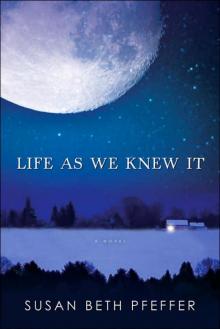 Last Survivors 01 - Life as We Knew It
Last Survivors 01 - Life as We Knew It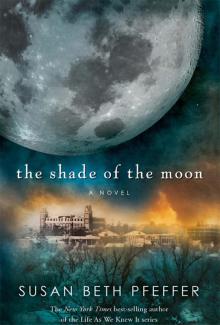 Last Survivors 04: Shade of the Moon
Last Survivors 04: Shade of the Moon Thea at Sixteen
Thea at Sixteen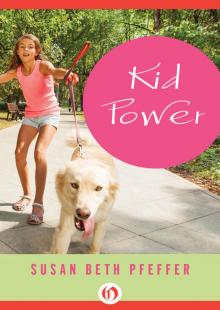 Kid Power
Kid Power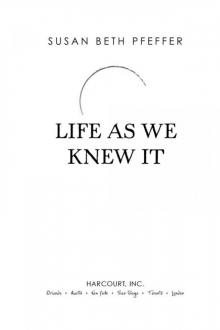 Life as We Knew It
Life as We Knew It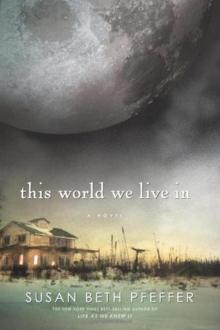 This World We Live In
This World We Live In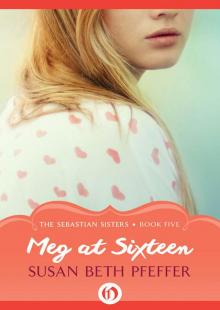 Meg at Sixteen
Meg at Sixteen Blood Wounds
Blood Wounds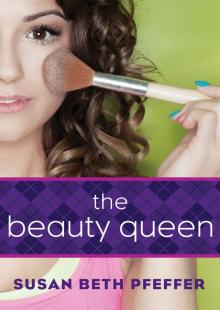 The Beauty Queen
The Beauty Queen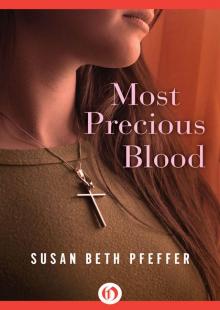 Most Precious Blood
Most Precious Blood The Dead and the Gone
The Dead and the Gone Sybil at Sixteen
Sybil at Sixteen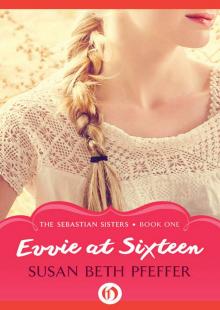 Evvie at Sixteen
Evvie at Sixteen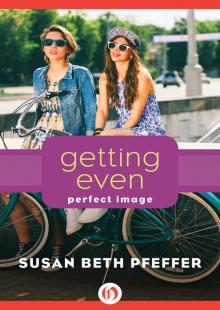 Getting Even
Getting Even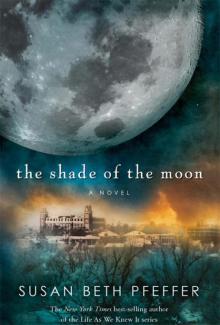 Shade of the Moon ls-4
Shade of the Moon ls-4 The Dead and Gone
The Dead and Gone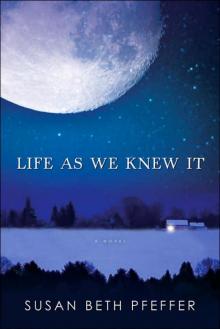 Life As We Knew It lawki-1
Life As We Knew It lawki-1 Fantasy Summer
Fantasy Summer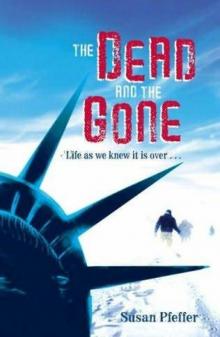 The Dead and the Gone ls-2
The Dead and the Gone ls-2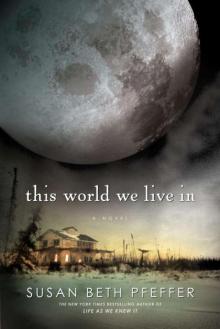 This World We Live In ls-3
This World We Live In ls-3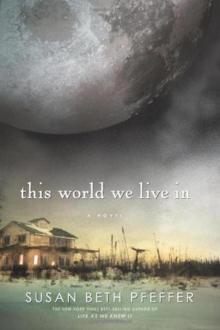 This World We Live In (The Last Survivors, Book 3)
This World We Live In (The Last Survivors, Book 3)